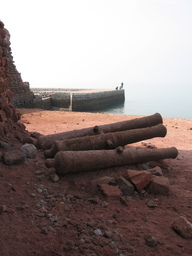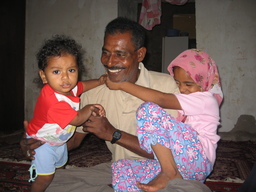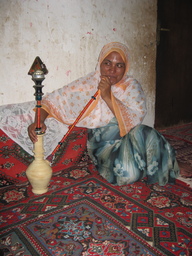 ISFAHAN, Iran
ISFAHAN, Iran
November 23, 2007
 ISFAHAN, Iran
ISFAHAN, Iran
November 23, 2007
My final day in the Persian Gulf was this past Sunday. It was also my best day in Iran. A castle by the sea, an invitation to lunch with a local family, and a hookah-pipe all played roles in shaping my day.
The Isle of Hormuz is a tiny speck in the Persian Gulf. The total area of the island is smaller than that of most cities--Hormuz is an underdeveloped backwater with little infrastructure and scarce opportunities. Fishing is the only industry. Life is probably not much different from that on other small Gulf islands with small populations. I chose to make the trip out to Hormuz only because I wanted to visit its castle.
The Hormuz of today is a slight shadow of what it must have been a few centuries ago. It's the only territory in Iran which was controlled as a Portuguese colony. Up through the 16th century the island was wealthy, the central hub linking trade between Europe, the sub-continent, and points beyond. By the 17th century the Portuguese got kicked out, today the only remnants of Hormuz' splendors past are at the island's northern cape: a crumbling castle and a few rusting cannons.
I've seen castles and cannons in better condition, elsewhere. What made the ruins on Hormuz special was their location: right on the shoreline, far away from everywhere else. I'm sure that if the castle were more accessible (i.e., on the mainland) there would be crowds visiting, admission tickets being sold. The day I spent poking around the castle I had the place to myself most of the time.
I climbed to the top of the ramparts and found a place to hide from the sun. For an hour I just sat, taking in the Gulf water, the old stonework, and the village behind me. I went through three bananas and a bottle of mango juice just sitting, contemplating the setting. Other tourists passed below now and again, but few climbed even halfway to the point where I was perched.
Finally, another visitor made it up to the part of the castle where I was seated. We said our salaams. It turned out he was a retired teacher who spoke English well, Mr. Mohammed Ali. Our conversation began with the standard questions: "Where are you from? What are you doing here?".
I've resigned myself to sharing the same basic information nearly every day: it's just a part of travel. I too would probably open with some variation on, "Where are you from? What are you doing here?" myself, if I were to meet a traveler passing through my home country. But being on the receiving end of the same line of questions for months--years, really--has made me quick to decide whether to engage or escape conversation. It's usually within the first minute or two of meeting somebody new I decide whether to continue on.
Mohammed Ali didn't make the mistake that turns me off right away: peppering me with questions.
For a lot of people I meet, I'm the first foreigner, and certainly the first American whom they've encountered. Sometimes people are so excited to finally use the English that they have studied for years in school--their first time with a native speaker--that they can't turn off. This often occurs simultaneously with another negative: curiosity in meeting somebody out-of-place can make the questions come too fast. I find it easy to shut down when it feels more like an interrogation than a conversation.
Above anything else, what can make conversation hard to carry on is that people often find my answers bewildering. All the way from China I've been dogged with, "How old are you?" "How much money do you make?" "Are you a Muslim?" "Are you married?" "Why not?" among other questions that would be considered impolite in the West. It's not so much the nature of the questions I mind--I know that these are legitimate openers across much of the world. Much of what's wearying is the sameness of what's asked. Above all, what kills the conversation is my inability to give honest answers. When I answer truthfully, most people either don't believe or don't understand my responses. For example:
Mohammad Ali avoided all of these pitfalls. Rather than his third question being, "How much money do you make?" or some other conversation-killer, he asked me, "Do you know who Mohammed Ali Clay is?" That actually answered the very question I was contemplating. Hearing the name "Mohammed Ali" I couldn't think of anybody other than the boxer. At that very moment I was pondering how the prizefighter would be referred to in countries where "Mohammed Ali" is just as common a name as "Michael" or "Jonathan" is in English-speaking countries.
After we strolled down the crumbling ramparts together, Mohammed Ali tracked down the castle caretaker. The caretaker unlocked gates to the more interesting corners of the castle: an underground church, a prison, and a colossal reservoir. He also took the time to introduce the background history of each place to us. Being in Persian, I couldn't understand much of the descriptions the caretaker gave, though Mohammed Ali translated the most central points.
 When we'd seen what there was to see of the castle, the invitation for lunch came. Mohammad Ali had made the visit to Hormuz to visit a local friend, Abbas. After visiting the castle, he was planning to go back to Abbas' family home for lunch, then explore the island further. Would I like to join them? I readily accepted. We walked into town together with Abbas and two of his young daughters, all of whom had tagged along to the castle that morning.
When we'd seen what there was to see of the castle, the invitation for lunch came. Mohammad Ali had made the visit to Hormuz to visit a local friend, Abbas. After visiting the castle, he was planning to go back to Abbas' family home for lunch, then explore the island further. Would I like to join them? I readily accepted. We walked into town together with Abbas and two of his young daughters, all of whom had tagged along to the castle that morning.
As with the previous day on another island across the Gulf, I was welcomed into a local's home. Abbas' wife had prepared a huge lunch, I'm sure in anticipation of their guest, Mohammad Ali. There were deep-fried prawns, french-fries, three types of salad, and saffron rice. Mohammad Ali asked me whether I smoked, I replied that I had no interest in cigarettes, I smoked only the occasional hookah. Upon finishing lunch, the family set a hookah up in their main living area, just for me to smoke. I was embarrassed by their hospitality: Abbas had told me before lunch that his wife had recently forbidden him from smoking inside the house, concerned for the health of their four daughters. I felt better when Abbas' wife (whom I knew only as Mrs. Hormuzi) finished the hookah off herself after I'd had my fill.
It was the perfect sort of travel encounter: being welcomed into a family home, connecting, communicating. I was initially shy, reluctant to ask whether I could take any photographs. Finally, I got up the nerve to ask; the family became eager to have even more photos taken after seeing the initial images of themselves in the display screen of my digital camera. I felt that here was some small gesture I could offer to reciprocate their kindness, sending them some informal family portraits. Abbas' family was clearly poor, living in an old house with few posessions. I promised to mail them prints of the shots I took, then did so from the next town I stayed in.
 Upon parting ways, I thought of another item I could offer as a token of my appreciation. I removed the compass from the band of my wristwatch and gave it to Abbas. When leaving Urumqi this summer I took along a few dozen of the thousand compasses which Zach and I bought this past May. I probably should have brought along more. At first, I was giving them only to people who noticed the compass on my watch and commented on it. In recent weeks I've realized what a perfect gift these make for people in this area of the world: praying towards Mecca requires knowing which way you're oriented.
Upon parting ways, I thought of another item I could offer as a token of my appreciation. I removed the compass from the band of my wristwatch and gave it to Abbas. When leaving Urumqi this summer I took along a few dozen of the thousand compasses which Zach and I bought this past May. I probably should have brought along more. At first, I was giving them only to people who noticed the compass on my watch and commented on it. In recent weeks I've realized what a perfect gift these make for people in this area of the world: praying towards Mecca requires knowing which way you're oriented.
Mohammad Ali and I took the last speedboat back to the mainland port city of Bandar Abbas, where he was staying a friend. Though native to Isfahan, in his retirement Mohammad Ali has been taking the past few months visiting various areas around Iran. At the moment he was in the middle of a couple-month, on-again/off-again stay with a friend in Bandar. I accepted the inevitable invitation back to their home for tea. I would have been happy to spend more time with such a welcoming person under any circumstance, but was particularly curious to see the inside of an average home in Iran. I had only seen the interior of a home for the first time the previous day, that of the shipwright on Qeshm Island. I wanted to know what apartments in the city would look like.
Being Iran, I wasn't surprised to see beautiful Persian carpets covering the floors. The rest of the decor was familiar, not much different from people's tastes back in Xinjiang. The taste Uighurs have--and now I know Iranians also share--is something of a flowery, pink aesthetic heavy on chandeliers and faux columns. I've heard it best described as, "living inside a wedding cake".
There were invitations from Mohammed Ali and his friend for me to stay on the night at their apartment. I was tempted. The flat was nice, there were 500 channels of pirated satellite TV, and I eyed a washing machine in the kitchen. I knew that the offer to stay was genuine, but still declined. Partly, I didn't want to overstay my welcome. Partly, I did want to move along sooner, retracing my route back to the north. Mostly, I just wanted to conclude a perfect day.
The two flatmates drove me to the bus station. I bought a ticket for the overnight run back up to Yazd.